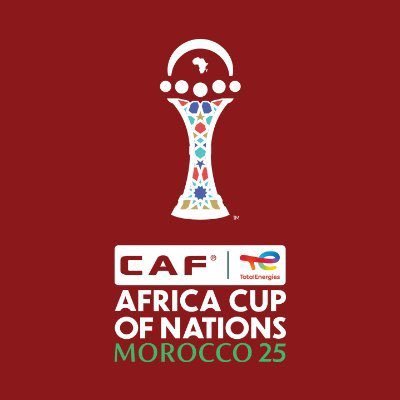The 2025 AFCON will be the 35th edition of the biennial Africa Cup of Nations tournament organised by the Confederation of African Football (CAF). It will be the second time that the competition will be hosted by Morocco, after initially doing so in 1988.
Morocco was originally scheduled to host the 2015 edition, but withdrew due to fears stemming from the Western African Ebola virus epidemic.
FootballOrbit provides a detailed guide to this year’s edition of Africa’s flagship international football tournament.
Hosting and Schedule: 2025 AFCON
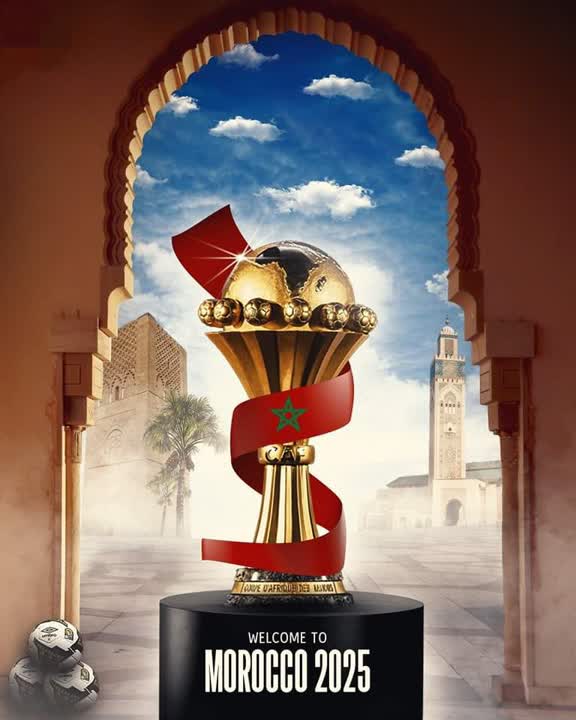
The 2025 AFCON will take place between the 21st of December 2025 to the 18th of January 2026. This is because FIFA expanded its Club World Cup competition to 32 teams and scheduled it for June and July 2025.
Moreover, it will be the first time ever that the AFCON will be played over the Christmas and New Year period.
Previously, the AFCON always takes in January. The 2025 edition of the tournament was scheduled to be the second after 2019 to take place during the northern hemisphere’s summer (June-July), in order to reduce scheduling conflicts with European club teams and competitions.
However, the 2023 edition was moved to January and February 2024 owing to the adverse summer weather conditions in Ivory Coast.
Guinea was originally set as hosts for the 2025 AFCON, but had its hosting rights stripped after affirming its inadequacy of hosting preparations. After a second bidding process, Morocco was named as the new hosts in September 2023.
Ivory Coast are the defending champions, having beaten Nigeria in a stunning comeback on home soil.
Qualified Teams for the 2025 AFCON
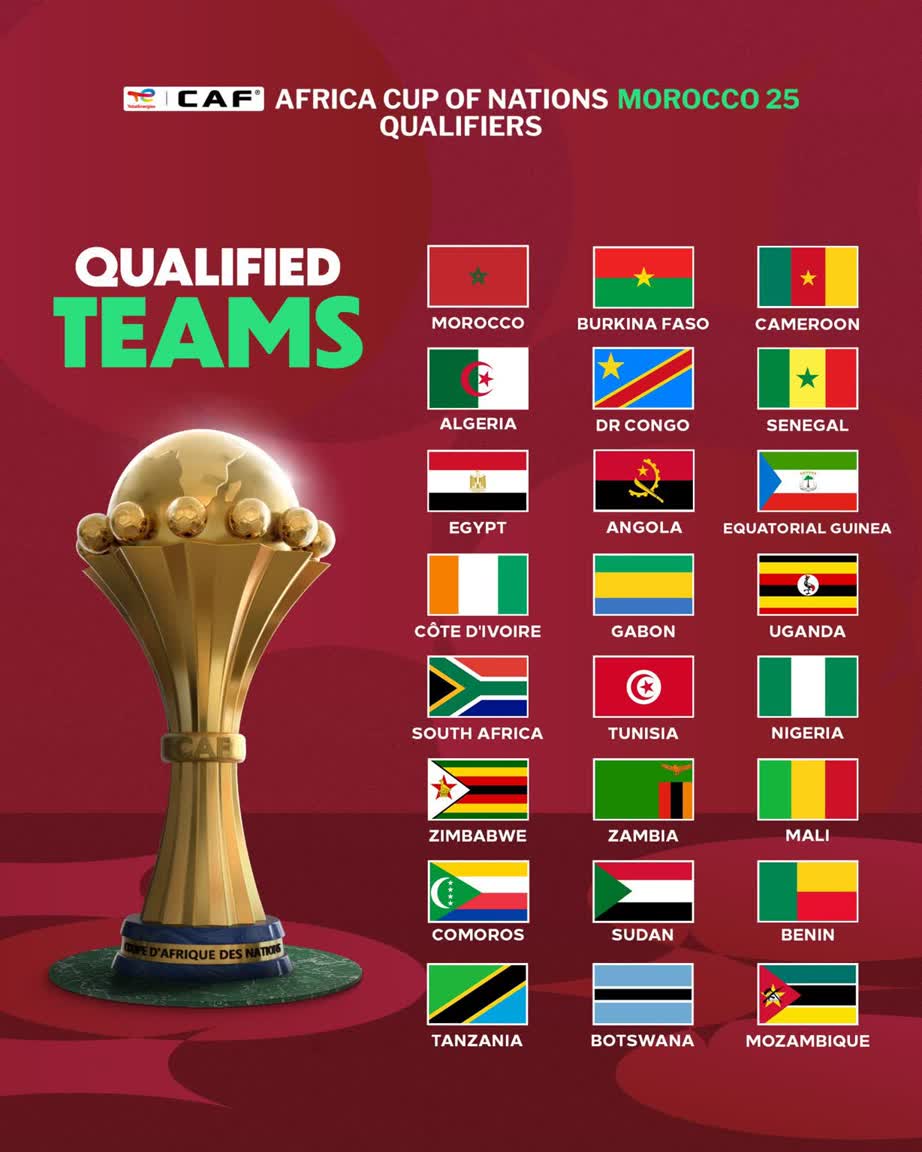
24 teams qualified for AFCON 2025, they are:
- Morocco (Host)
- Cameroon
- Senegal
- Algeria
- Egypt
- Ivory Coast
- Nigeria
- South Africa
- Tunisia
- Equatorial Guinea
- Comoros
- DR Congo
- Mali
- Zambia
- Angola
- Uganda
- Gabon
- Sudan
- Mozambique
- Burkina Faso
- Benin
- Zimbabwe
- Tanzania
- Botswana.
#. Tunisia qualified for the 22nd time and extended their record for consecutive participations, reaching the tournament for the 17th time in a row — having not been absent since 1994!!!
#. Comoros, Gabon, Sudan and Zimbabwe made their return to the continental tournament after missing out on AFCON 2023.
#. Benin and Uganda made their return after an almost five-year absence from the tournament.
#. Botswana qualified for the second time after their first participation in 2012.
#. Ghana’s absence marks a significant change, as they missed the tournament for the first time since 2004.
#. Cape Verde, Gambia, Guinea, Guinea-Bissau, Mauritania and Namibia also failed to qualify after appearing in 2023.
2025 AFCON Groups
The 24 teams are divided into 6 groups (A-F) of 4 teams each, and here’s the group stage lineup:
Group A
- Morocco
- Mali
- Zambia
- Comoros
Group B
- Egypt
- South Africa
- Angola
- Zimbabwe
Group C
- Nigeria
- Tanzania
- Tunisia
- Uganda
Group D
- Senegal
- DR Congo
- Benin
- Botswana
Group E
- Algeria
- Burkina Faso
- Equatorial Guinea
- Sudan
Group F
- Ivory Coast
- Cameroon
- Gabon
- Mozambique
Furthermore, each group plays a round-robin format (3 matches).
The top two teams from each group advance, along with the four best third-place teams.
Knockout Rounds
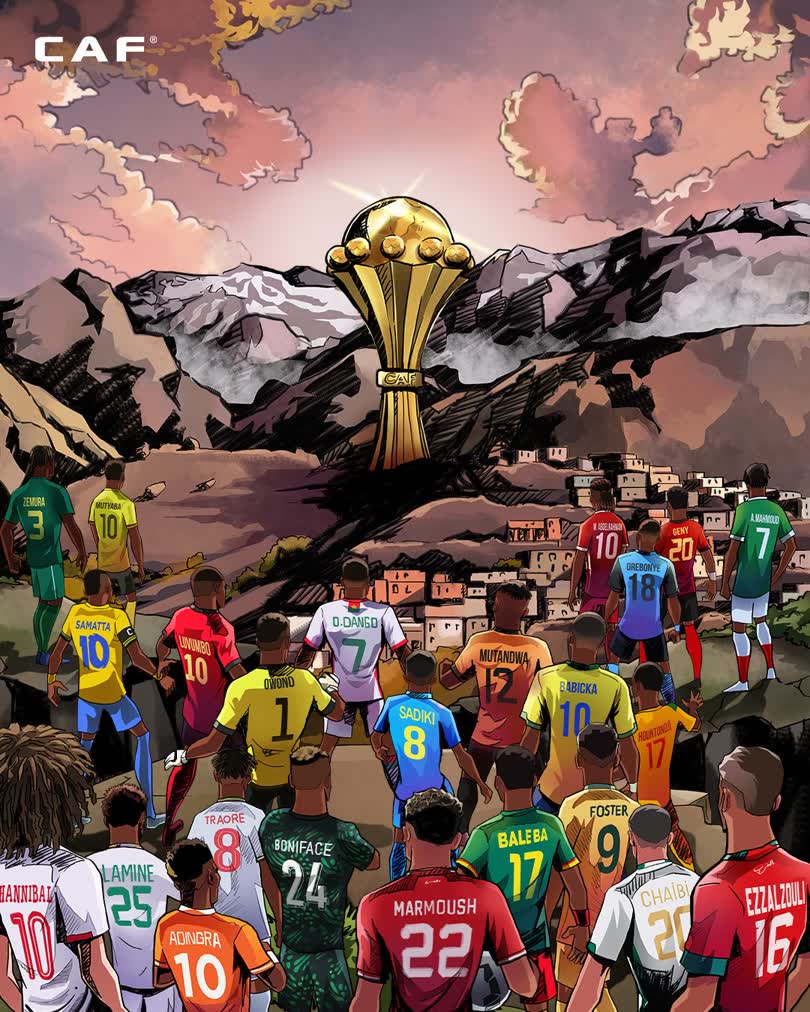
- The top two teams from each group will advance to the Round of 16, which starts on January 3, 2026.
- The tournament will then proceed through the quarter-finals, semi-finals, and the final.
- Last 16: Saturday January 3 2026 to Tuesday January 6 2026.
- Quarter-finals: Friday January 9 2026 and Saturday January 10 2026.
- Semi-finals: Wednesday January 14 2026.
- Third-place play-off: Saturday January 17 2026
- Final: Sunday January 18 2026.
Stadiums & Host Cities for the 2025 AFCON
Matches will be played in six cities and nine stadiums across Morocco:
- Complexe Sportif Prince Moulay Abdullah, Rabat, (69,500 capacity).**
**opening game and final.
- Stade Al Barid, Rabat,(18,000 capacity).
- Stade Olympique Annexe Complexe Sportif Prince Moulay Abdullah, Rabat, (21,000 capacity).
- Complexe Sportif Prince Héritier Moulay EL Hassan, Rabat, (22,000 capacity).
- Complexe Sportif Mohammed V, Casablanca, (45,000 capacity).
- Grand Stade d’Agadir, Agadir, (41,144 capacity).
- Grand Stade de Marrakech, Marrakech, (41,245 capacity).
- Complexe Sportif de Fès, Fes, (35,468 capacity).
- Grand Stade de Tangier, Tanger, (75,600 capacity).
These cities are known for their modern infrastructure and large football followings.
AFCON trophy and medals
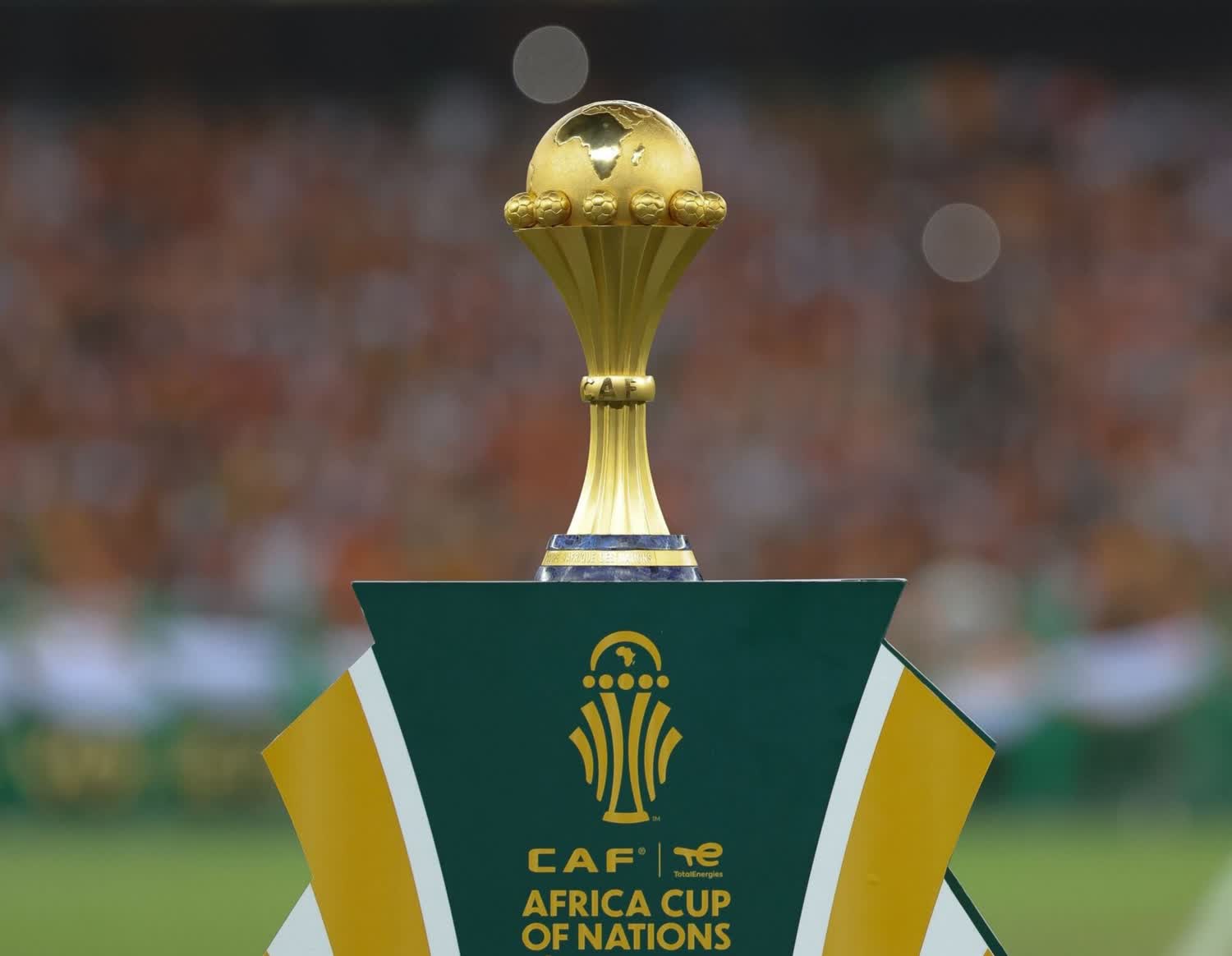
Throughout the history of the Africa Cup of Nations, three trophies have been awarded to the winners of the competition. The original trophy, made of silver, was the Abdelaziz Abdallah Salem Trophy, named after the first CAF president, Egyptian Abdelaziz Abdallah Salem.
Moreso, as the first winner of three Africa Cup of Nations tournaments, Ghana obtained the right to permanently hold the trophy in 1978.
The second trophy was awarded from 1980 to 2000 and was named “Trophy of African Unity” or “African Unity Cup”.
It was given to CAF by the Supreme Council for Sports in Africa prior to the 1980 tournament and it was a cylindrical piece with the Olympic rings over a map of the continent engraved on it. It sat on a squared base and had stylized triangular handles.
Moreover, Cameroon won the Unity Cup indefinitely after they became three-time champions in 2000.
In 2001, the third trophy was revealed, a gold-plated cup designed and made in Italy. Cameroon, permanent holders of the previous trophy, were the first nation to be awarded the new trophy after they won the 2002 edition.
Likewise, Egypt won the gold-plated cup indefinitely after they became three-time champions in 2010.
Unlike previous winners who would have then taken the trophy home, Egypt was presented with a special full-size replica that they were allowed to keep.
The winner of each edition receives a replica whose dimensions are equal to that of the original trophy.
Also, CAF give 30 gold medals to the winning team, 30 silver medals to the runners-up, 30 bronze medals to the team ranked third and 30 diplomas to the team ranked fourth in the final tournament.
Some facts about AFCON
- Egypt is the most successful nation in the tournament’s history, winning the tournament seven times, with Cameroon winning five times and Ghana four times.
- Egypt won an unprecedented three consecutive titles in 2006, 2008, and 2010.
- In 2013, the tournament format was switched to being held in odd-numbered years so as not to interfere with the FIFA World Cup.
- Ten teams have NEVER qualified for the AFCON: Central African Republic, Chad, Djibouti, Eritrea, Eswatini, Lesotho, Sao Tome and Principe, Seychelles, Somalia and South Sudan.

